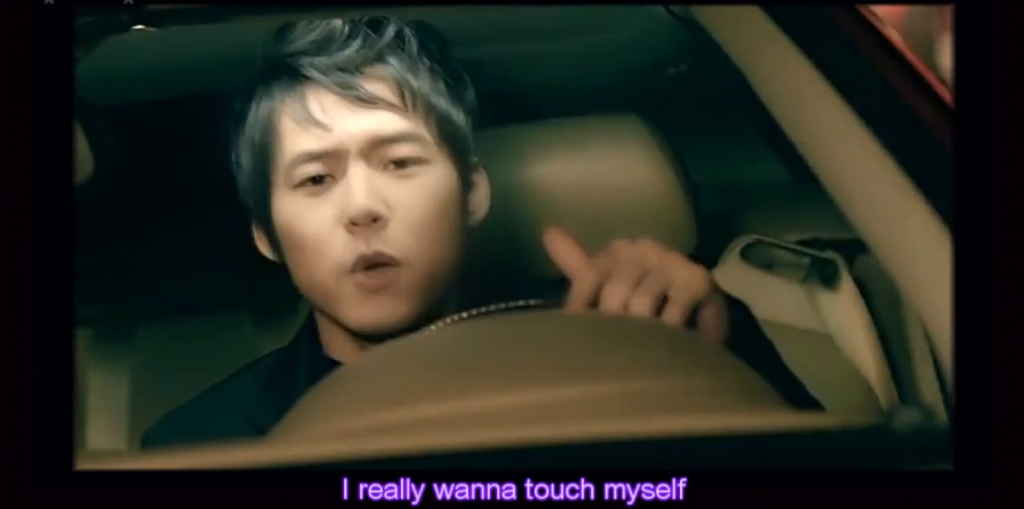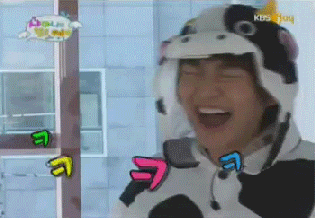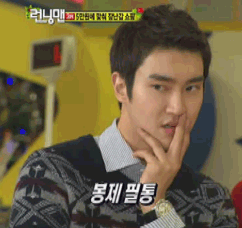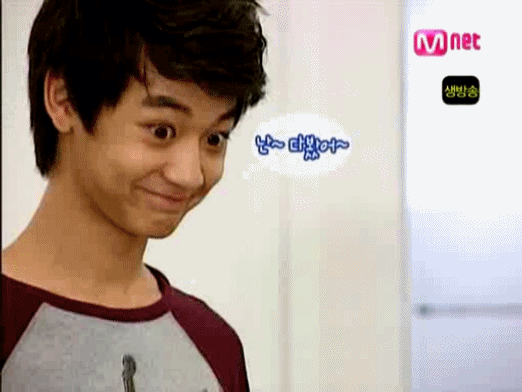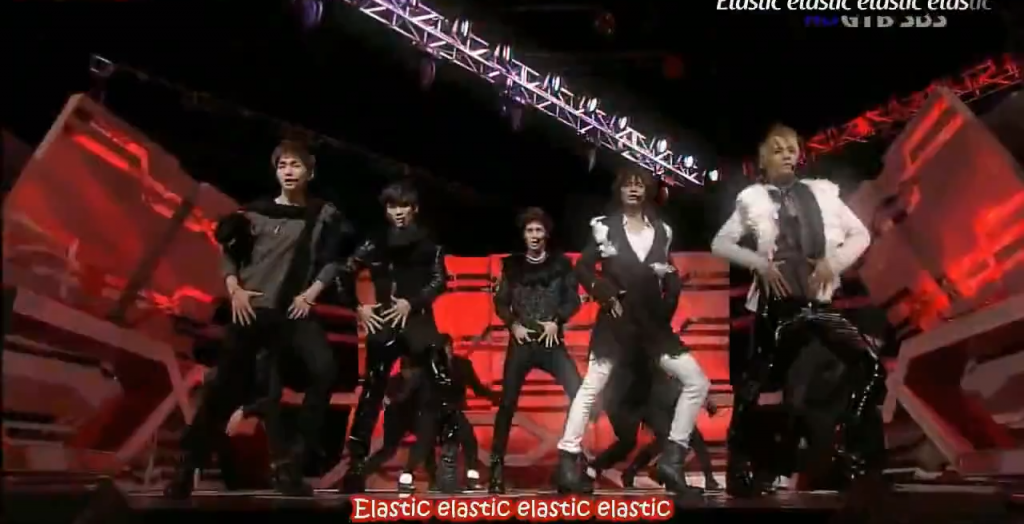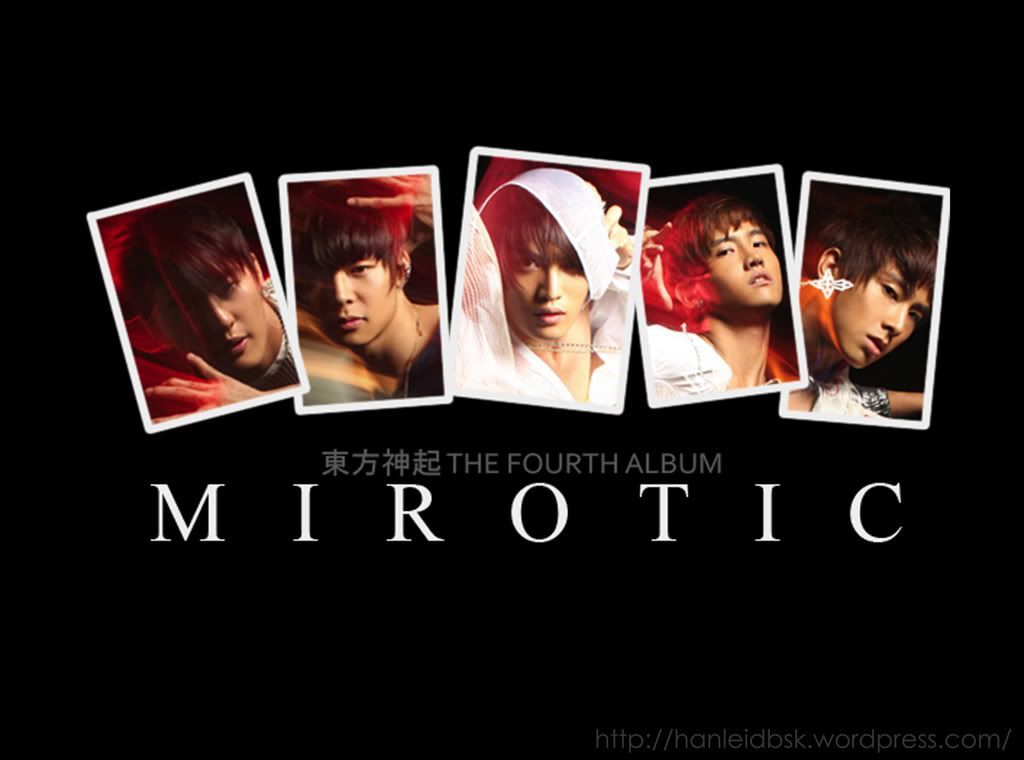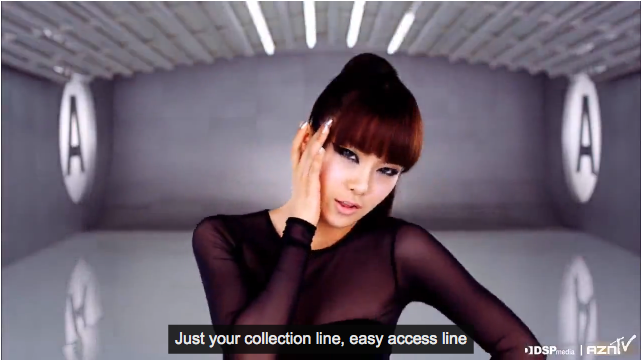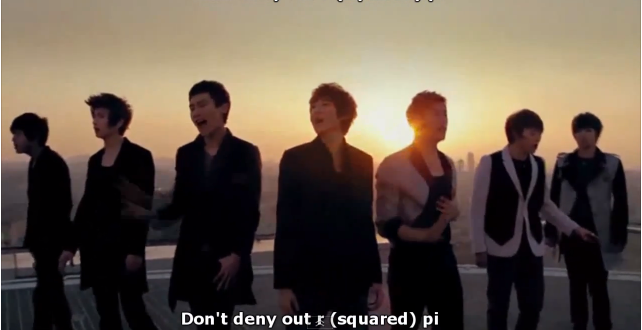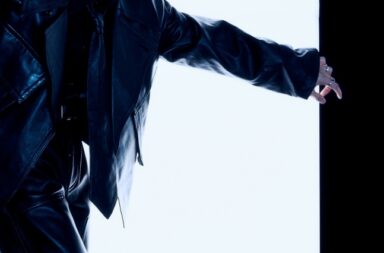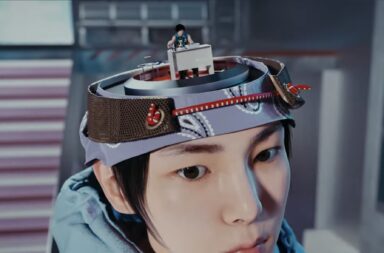Like most absurd things, one’s acceptance of misplaced, awkward English phrases in K-pop (also known as ‘Engrish’) comes in stages.
PROGRESSION OF ENGRISH TOLERANCE, AS EXPRESSED BY QUOTATION AND GIF
Stage 1 (0-4 months of exposure): “BWAHAHAHAHA WHAT’S A LOVERHOLIC ROBOTRONIC SUPPOSED TO MEAN BWAHAHAHA”
Stage 2 (4-8 months of exposure): “Omigod, why is MBLAQ asking everyone to listen to their ‘Y’? What is a ‘Y’? This is embarrassing.”
Stage 3 (8-12 months of exposure): “Can someone please give Yoochun an English proofreader to edit his raps? Can it please be me?”
Stage 4 (12+ months of exposure): “EVERY DAY I SHOCK, EVERY NIGHT I SHOCK, WITH MY SHORTY SHORTY SHORTY SHORTY AND MY A-A-A-A, CAUSE WE GOTTA PURPLE LIKE THAT, AND I’M GONNA TELL ABOUT THIS, YO!”
Personally, I think I’m at the point where I’m so over the hill that even the silliest of all silly Engrish phrases fail to faze me anymore. This can partially be attributed to my huge SM bias and my affinity for anything by Yoo Young-jin…who, by the way, was the one who made up thirty thousand new words ending in “-tic” and put them in almost every song he’s released since 2008. Needless to say, K-pop is chock full of bad English, and as English speakers (particularly native English speakers), it’s easy for us to wonder why a culturally progressive and globalized country like Korea can’t manage to rid their pop music of the embarrassing half-English that makes English-speaking fans cringe. Heck, some of us might wonder why K-pop insists on using English at all if they can’t get it right.
But it seems that the idea of English in K-pop extends beyond the realms of grammatical mishaps and intermittent lulz. In this age of globalization, the utilization and integration of the English language in non-English speaking locales has become a sign of modernization and progression, and Korea is no exception. All around the world, usage of the English language exudes a feeling of modernity and “freshness.” It doesn’t matter if the English usage in question exhibits perfect grammar or spelling. Rather, the mere essence of the English language – the way it looks, the way it sounds – conveys a different feeling than the native language in any given region. Compare this to Chinese characters printed on t-shirts or in tattoos. More oftentimes than not, the characters won’t make any sense to a native Chinese speaker, but people still insist on tattooing incorrectly translated Chinese phrases on various body parts just because it looks ‘exotic.’ Just as Chinese characters exude an ‘exotic’ feel to non-Chinese speakers, English words and phrases tend to exude feelings of modernity to non-English speakers.
Pop music is a product of modern culture, so it makes sense for Korean pop music to feature lots of English usage in order to express a feeling of modernity and freshness. Many K-pop music composers will stick in a few random English phrases in their songs because – you guessed it: it just sounds cool. If you don’t get what I mean, take a listen to Regina Spektor’s “Apres Moi.” The majority of the song is in English, but she sings one verse in Russian. And even if you don’t understand what she’s singing about – especially if you don’t understand what she’s singing about – you’ll notice that that one verse gives the whole song that extra ‘umph’ and evokes different feelings than the parts of the song that are sung in English. Language usage isn’t just a way to convey meanings and words between people of similar tongues. It is also capable of implicitly conveying emotions and ideas.
The Korean language, in particular, exhibits a significant amount of English language influence, as shown by the prevalence of English loanwords in everyday Korean vernacular. Even the most casual of K-pop fans can observe this phenomenon through Korean variety programs, where words like “han-deu-pon” (handphone, or cell phone) and “koh-pi” (coffee) are part of everyday Korean conversation. Five percent of the entire Korean language is borrowed from non-Sino-Japanese languages, such as German (“a-reu-ba-i-teu” = arbeit = part time job) and, of course, English. English plays a disproportionately large role in Korean society, and has arguably become a defining point of modern Korean culture. However, the presence of English in Korea seems to adapt a different role than it does in many other cultures.
Dr. Jamie Shinhee Lee, a linguistics professor at the University of Michigan-Dearborn, published a paper in 2006 discussing the usage of English phrases in Korean television commercials. In the paper, Dr. Lee addressed the meaning behind several English phrases – phrases that would otherwise sound odd to native English speakers. For instance, a commercial for Olympus (a digital camera brand) featured a young woman taking pictures. She zooms up to an attractive young man, and as she takes the photo, the man somehow begins to float in the air and becomes unable to control his body movements.
This commercial is then underlined by the English phrase “Eye Want,” which, to the native English speaker, makes absolutely no sense. If we were vying for grammar points here, the proper phrase would be “An eye wants” or “Eyes want,” as per proper English. But no, the phrase is “Eye Want,” which, for the initial comedic value in its nonsensical-ness, actually holds a rather clever meaning. It plays up on the phrase “I want” – a phrase that effectively puts the subject – in this case, the young woman – in charge of her actions and desires. This then also sends a sociologically based message to young Korean woman – a message expressing empowerment and strength. The usage of “Eye” as a homophone to “I” then creates a connection between the intrinsic meaning of the advertisement – self-empowerment – and the actual product that’s being advertised – the camera.
Another interesting example is found in a coffee commercial, which features the tagline, “Cafe Latte Espresso. 사랑한다면 cafe latte 처럼” which roughly translates to: “Cafe Latte Espresso. If you love someone, love them like cafe latte.” Once again, I’m fairly certain that “cafe latte espresso” isn’t an actual colloquialism in the English language, let alone a beverage available at your average coffee shop. But the phrase “cafe latte espresso” is actually more metaphoric than it is an advertisement for the product that the commercial is actually selling. The phrase juxtaposes two different coffee beverages – cafe latte, which is light and mild; and espresso, which is dark and strong – and uses them to metaphorically describe the dynamics of a romantic relationship. Dr. Lee comments that the metaphor “successfully delivers what it means to be in love for Koreans … the bonding of espresso with café latte is attempting to convey the masculine passion and feminine sweetness of love.”
Clever, right? Of course, most of the examples of English found in typical K-pop don’t hold meanings that are as deep or complicated as that of the aforementioned examples, but it should allow us to think a little more deeply about the usage of English in K-pop music. One of my favorite examples is the usage of Words Ending In “-Tic” in many songs by SM artists. Like I said before, most of these words don’t actually exist and have no meaning, but considering the placement and usage of these ‘words’ within song lyrics, one can hypothesize exactly why these words have held such appeal to Yoo Young-jin and company.
Most DBSK fans will know that Jaejoong was the one who came up with the title for DBSK’s fourth album, Mirotic. It is said that the word ‘mirotic’ is derived from the Korean word for ‘maze’ – mi-ro – and the English suffix ‘-tic.’ The ‘-tic’ suffix can hold multiple meanings depending on context, but it commonly means “of” – e.g. ‘hedonistic’ refers to something that expresses or is “of” hedonism; ‘romantic’ refers to something that expresses or is “of” romance. Using this pattern, the word “mirotic” is an adjective that refers to something that is “of” a maze – or expresses the feeling of being trapped or lost. Look at the lyrics to the title song. Make sense now?
However, the word “mirotic” serves greater purpose beyond its definitional meaning. When put to music, the hardness of the sound made by the suffix ‘-tic’ is able to punctuate beats and place emphasis on certain parts of a song. Phrases like “fantastic-elastic,” “loverholic-robotronic” and “electronic-manic-supersonic-bionic” are actually carefully crafted to define the beat or pitch structure of a certain part of a song. The usage of “electronic-manic-supersonic-bionic-energy” in BoA‘s “Hurricane Venus” does a really great job of defining the sudden changes in meter during that particular section of the song. The usage of “-tic” in pop music lyrics – particularly that of electronic pop music with complicated beats complimented by an otherwise mismatching vocal line – is incredibly effective and useful. And that’s probably why SM insists on making up and using words that end in “-tic” in all of their songs. Because it just works.
The reasoning behind SHINee‘s name is similar. At first, I had actually refused to be interested in anything that was as ridiculous as the word “SHINee” simply because it sounded dumb. Things weren’t much better when I found the explanation behind the name: it was a combination of the adjective “shine” and the noun suffix “-ee,” which refers to “one who _____”. Hence, SHINee refers to “one who shines.” Which is, you know, fairly clever. But to me, it was still one of those “i c wut u did thar” moments where your feelings are a mix of admiration for the relative cleverness of the phrase and simultaneous disdain for the enduring nonsensicality of it all.
And that’s exactly the problem, I guess. The thing with “English-speaking privilege” (akin to white privilege, straight privilege, etc.) is that as English speakers, we expect the world to be suited towards our English-speaking needs, and we try to measure all usage of the English language by our own narrow standards. And why? Well, to us, we feel that English has been widely accepted as the “norm” – the supposed “standard” for modernization. As English speakers, we expect English to have one purpose and one purpose only: as a vessel for the coherent and syntactically-and-semantically correct communication of words, thoughts, and ideas. So when we see English used in an unfamiliar context, we treat it with the same regard as any other example of English we see in our everyday lives, instead of acknowledging the possibility that to others, the entire concept of the English language may hold a different meaning than that of our own.
In today’s K-pop, the usage of English extends far beyond the scope of simply ‘sounding cool’ or even beyond the idea of evoking a modern image. Rather, the normalization of using English in Korean songs allows lyricists to use English words as creative tools to make a song sound more interesting, or more multidimensional, or give a song a certain flavor or punch that it previously didn’t have. Korean audiences probably don’t care as much about the grammatical imperfections of an English phrase as much as they do the effect that the English phrase has upon their listening experience. English in K-pop is simply another facet in the creative process of K-pop music, and it should be respected as such – regardless of whether English is your mother tongue or not.
I’m not saying that it’s wrong for us to have a laugh at some English mishaps every now and then, but as a largely English-speaking community, the international K-pop fandom ought to not think little of a concept like “Engrish” just because it doesn’t align with our own pre-established systems of normalcy. It’s akin to when a person who’s unfamiliar with K-pop (or Korean culture on the whole) sees two Korean guys being physically affectionate with each other and immediately writes them off as being gay, without considering the possibility that friendly relationships between guys in Korea can be expressed in ways apart from chest-bumping and brofisting. It’s wrong for us to judge other cultures while expecting that these cultures will align with our own cultural standards, and then proceed to ridicule or belittle said culture when things don’t quite match up with our own preconceived notions of what is considered “correct.”
I’m assuming that most of y’all here at Seoulbeats are here because you have some sort of invested interest in Korean pop culture, and I’ll go ahead and make a guess that, for most of you, Korean pop culture is a culture that’s different from your own cultural background. And snaps are certainly in order for those who have opened their minds to other cultures and have been generally accepting of different cultural norms. But it’s time to take things one step further and put a stop to so-called ‘English-speaking privilege’ because, frankly, there is more to language that simply words and sentences and grammatical correctness.
